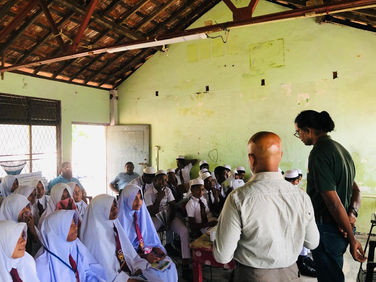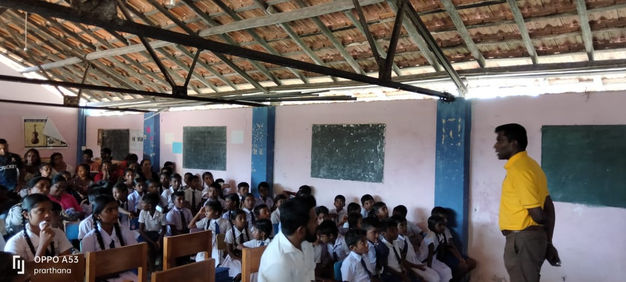
EDUCATION & AWARENESS
Workshops and Exhibitions
The TCP’s education unit aligns with key environmental policy documents, including the National Marine Turtle Action Plan, the Biodiversity Conservation Action Plan (BCAP), and the National Environmental Action Plan (NEAP). To implement the recommended public awareness activities, the TCP organizes workshops and exhibitions across Sri Lanka to educate the public and enhance knowledge of coastal and marine habitats essential for sea turtles. These events engage school children, researchers, government agencies, NGOs, and the public.
Additionally, the TCP hosts specialized workshops for key government and non-governmental organizations with direct or potential influence on marine conservation in Sri Lanka, such as fisheries cooperatives, the Sri Lanka Tourist Board, and local law enforcement agencies.
Objectives of Workshops and Exhibitions,
-
Encourage youth involvement in sea turtle conservation.
-
Foster an appreciation for sea turtles among the public.
-
Draw attention to urgent marine and coastal conservation issues.
-
Promote collaboration between government agencies, NGOs, researchers, and community members.
-
Summarize the TCP’s community-based conservation activities in Sri Lanka from 1993 to 2006.
Exhibitions feature detailed explanations of different sea turtle species, the TCP’s conservation work, and interactive educational materials. In some instances, the TCP invites government organizations to contribute information on marine habitats. Exhibitions often include educational videos on sea turtles, their biology, conservation efforts, and threats such as illegal exploitation. Visitors can purchase merchandise, collect free informational materials about TCP’s work, and sign up as members or volunteers.
SCHOOL LECTURES
Due to increasing human-caused threats to coastal ecosystems and marine turtles, the TCP launched school lecture programs to educate students about marine turtle biology, threats, conservation strategies, and sustainable management of marine resources. Our goal is to reduce unsustainable resource use and prevent destructive coastal activities.
Lectures, designed for students aged 12–18 and their teachers, incorporate visual aids to enhance engagement. By educating children at an impressionable age, the TCP hopes to instill a strong sense of environmental responsibility.
Since 1993, the TCP has conducted marine turtle educational workshops for students and teachers in coastal schools between Kalpitiya and Kirinda, particularly in fishing communities and near sea turtle nesting sites. These workshops raise awareness about sea turtles, their conservation, and associated threats. The TCP also distributes educational materials such as posters, booklets, and leaflets. As a result, several schools have formed student-led turtle conservation groups, increasing community participation in conservation and research while fostering local support for marine turtle protection.
FILM SHOWS
The environmental film show program is one of the TCP’s most popular educational initiatives, designed to spread conservation awareness and enhance interest in environmental protection. The films cover topics such as sea turtles, mangroves, coral reefs, and general wildlife conservation. First launched in 2000, this program remains a key component of TCP’s outreach efforts.
Target audiences include,
-
Coastal communities
-
Fisheries cooperatives
-
Media professionals
-
NGO members
-
Other local stakeholders
Objectives of Film Shows,
-
Inspire enthusiasm for wildlife conservation among coastal residents.
-
Encourage communities to appreciate local natural beauty.
-
Increase awareness of sea turtle conservation.
-
Reduce threats such as beach lighting, littering, egg poaching, turtle hunting, and habitat destruction.
The TCP also conducts film screenings on remote islands, such as Battalangunduwa in Kalpitiya, where many local fishermen operate. These areas experience high rates of sea turtle bycatch. To ensure accessibility, the TCP operates a mobile film unit, allowing screenings in remote regions where conservation awareness is most needed.























